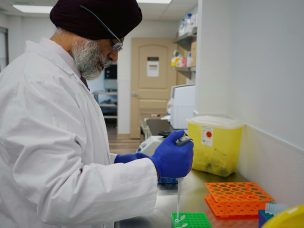OBGYN & Women’s Health
Phase 2 Analysis of HER2 Breast Cancer Drug Trastuzumab Deruxtecan
The phase 2 DAISY trial confirms that T-DXd efficacy depends on HER2 expression in breast cancer cases. However, it shows that T-DXd also has moderate activity in HER2-non-expressing patients, suggesting an alternative mechanism of action. Breast cancer is among the five most common causes of cancer mortality. Despite improvements in its treatment, 5-year survival rates...
Repeat Preeclampsia Testing Not Tied to Better Perinatal Outcomes
No benefit seen for stillbirth, early neonatal death, or neonatal unit admission Repeat placental growth factor (PlGF) testing in pregnant women with suspected preeclampsia is not associated with improved perinatal outcomes, according to a study published online Feb. 8 in The Lancet. Alice Hurrell, from King’s College London, and colleagues assessed whether repeat PlGF-based testing reduces...
Stage I Endometrial Cancer Post-Surgical Circulating Tumor DNA Levels: Patient Outcomes
by Deileta Kamhunga Post-surgical circulating tumor DNA detection is predictive of poor recurrence-free survival in stage I endometrial cancer patients, according to a recent retrospective analysis. Endometrial cancer (EC) is the most common gynecologic malignancy of the female reproductive tract. Circulating tumor DNA (ctDNA), a blood-based biomarker, predicts disease outcomes and detects molecular relapse ahead...
Trastuzumab Deruxtecan in Human Epidermal Growth Factor Receptor 2-Expressing Solid Tumors
Trastuzumab deruxtecan shows robust efficacy, durable clinical benefit, and safety consistent with the known profile in human epidermal growth factor receptor 2-expressing tumors in a phase II study. Trastuzumab deruxtecan (T-DXd), a human epidermal growth factor receptor 2 (HER2)-directed antibody-drug conjugate, is currently approved for treating HER2-expressing breast and gastric cancers and HER2-mutant non-small cell...
Ferroptosis May Offer New Avenues for Triple-Negative Breast Cancer Treatment
A systematic review explores the promising connection between ferroptosis, a form of regulated cell death, and triple-negative breast cancer, offering new insights into prognosis and treatment strategies. By identifying potential biomarkers and therapeutic targets related to ferroptosis, this research opens avenues for personalized treatment approaches to this form of breast cancer known for its aggressive...
Predictive Power of Machine Learning in Breast Cancer Treatment Outcomes
A retrospective study used machine learning to predict treatment response and survival rates in breast cancer patients from an underserved, inner-city population. The study examined the impact of tumor subtypes and socioeconomic factors on outcomes. Machine learning models reveal no association between pathological complete response and patient demographics but highlight the significance of tumor subtypes...
Understanding NUDT5: A Step Forward in Fighting Triple-Negative Breast Cancer
New research shines a light on fighting a difficult type of breast cancer, known as triple-negative breast cancer, by focusing on an enzyme that protects these cancer cells. This discovery opens up possibilities for treatments that are not only effective but that may also be gentler on the body. Research identifies the enzyme NUDT5 as...
A New Way to Predict Breast Cancer Treatment Success
A preliminary study reveals that tiny particles released by cancer cells may predict the effectiveness of breast cancer treatment, particularly for those facing triple-negative breast cancer. This research offers a promising approach to personalizing treatment plans, potentially improving outcomes for patients and providing new hope to individuals and their families navigating this challenging diagnosis. Dealing...
Unlocking New Treatments for Triple-Negative Breast Cancer
A type of signalling molecule called filamin A may play a key role in the battle against triple-negative breast cancer. This research could lead to more personalized and effective treatments by targeting the unique ways filamin A influences cancer growth and spread, offering new hope for those affected by this type of cancer, which is...
More Medical News














